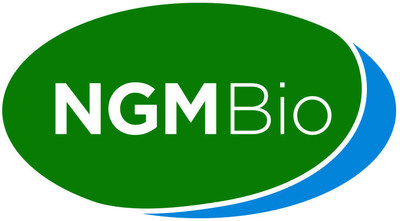

SOUTH SAN FRANCISCO, Calif., Nov. 9, 2015 /PRNewswire/ -- NGM Bio, a research-driven, clinical-stage biopharmaceutical company developing therapeutics for cardio-metabolic and liver diseases, today announced upcoming presentations of NGM282 data at the American Academy for the Study of Liver Diseases (AASLD) Annual Meeting (The Liver Meeting® 2015) being held November 13-17th in San Francisco, CA.

NGM282, NGM Bio's most advanced clinical program, is a first-in-class engineered protein variant of FGF19, a human hormone that inhibits bile acid synthesis. NGM282 is currently in development for the treatment of primary biliary cirrhosis, recently renamed primary biliary cholangitis (PBC), primary sclerosing cholangitis (PSC) and nonalcoholic steatohepatitis (NASH). Data to be presented include positive results from the NGM282 Phase 2 trial in PBC patients demonstrating improvement in primary biomarkers of disease and a favorable safety and tolerability profile, data demonstrating that NGM282 does not exacerbate pruritus and preclinical data demonstrating the biologic and anti-fibrotic activity of NGM282 in an established model of PSC.
"There is a significant unmet medical need for new treatments for cholestatic liver diseases," stated Marlyn Mayo, M.D., of UT Southwestern Medical Center and lead investigator for the NGM282 Phase 2 study in PBC patients. "These data suggest that new biologic pathways may offer novel treatment options for patients that are unresponsive to the current treatments and at the greatest risk for complications of cirrhosis."
Alex DePaoli, M.D., Chief Medical Officer of NGM Bio commented, "We are excited to see the robust biology of NGM282 translate into this significant beneficial effect on key biomarkers of hepatobiliary injury in patients afflicted with PBC, a disease exacerbated by disordered bile acid synthesis. The clinical effects in PBC patients, coupled with the activity we have shown for NGM282 in animal models of PSC and severe cholestatic injury, support our belief that NGM282 may also have significant benefits for people suffering from PSC and other disorders of bile acid synthesis."
Details on the oral and poster presentations are as follows:
Oral Presentations
Title: NGM282, A Novel Variant of FGF19, Demonstrates Biologic Activity in Primary Biliary Cirrhosis Patients with an Incomplete Response to Ursodeoxycholic Acid: Results of a Phase 2 Multicenter, Randomized, Double Blinded, Placebo Controlled Trial (Oral presentation 106)
Session: Presidential Plenary - Clinical, Room 3000
Presenter: Marlyn Mayo, M.D. – University of Texas Southwestern Medical Center
Date: Monday, November 16
Time: 11:45 – 12:00 PST
http://www.ngmbio.com/file.cfm/19/docs/Mayo_et_al_PBC_P2_Overall_Results.pdf
Title: Anti-inflammatory and Anti-fibrotic Activity of NGM282, A Novel Variant of FGF19, in an Mdr2-Deficient Mouse Model of Primary Sclerosing Cholangitis (Oral presentation 198)
Session: Parallel Session 29 - Pediatric and Metabolic Liver Disease: Basic, Room 2020
Presenter: Lei Ling, Ph.D. – NGM Biopharmaceuticals
Date: Monday, November 16
Time: 18:00 – 18:15 PST
http://www.ngmbio.com/file.cfm/19/docs/Ling_et_al_NGM282_MDR_Deficient_Mouse_Model_PSC.pdf
Poster Presentations
Title: Impact of NGM282 on the Incidence and Severity of Pruritus in Primary Biliary Cirrhosis Patients and Correlations with Liver Chemistries and Serum Bile Acids (Poster 627)
Session: Poster Session I - PBC/PSC and Other Cholestatic Disease, Exhibition Hall
Presenter: Marlyn Mayo, M.D., University of Texas Southwestern Medical Center
Date: Saturday, November 14
Time: Presenter in attendance from 17:30 – 19:00 PST
http://www.ngmbio.com/file.cfm/19/docs/Mayo_et_al_NGM282_PBC_Pruritus.pdf
Title: FGF15 and FGF19 Induce Disparate FGFR4-Mediated Hepatocarcinogenicity In Vitro and In Two Murine Models: Implications for Drug-Associated Carcinogenicity Risk Assessments (Poster 1986)
Session: Poster Session IV – Experimental Hepatocarcinogenesis, Exhibition Hall
Presenter: Lei Ling, Ph.D., NGM Biopharmaceuticals
Date: Tuesday, November 17
Time: Presenter in attendance 10:30 – 12:00 PST
http://www.ngmbio.com/file.cfm/19/docs/Ling_et_al_FGF15_vs_FGF19_Hepatocarcinogenicity.pdf
Additional information on the conference can be found on the AASLD web site: http://www.aasld.org/events-professional-development/liver-meeting-2015
About NGM Biopharmaceuticals, Inc.
NGM Bio applies fundamental discoveries in human pathophysiology to create novel biologics for the treatment of a broad spectrum of life-threatening diseases. NGM Bio's most advanced compound, NGM282, a wholly-owned asset, is being studied in primary sclerosing cholangitis (PSC) and other disorders of bile acid synthesis, as well as nonalcoholic steatohepatitis (NASH). NGM Bio has established collaborations with Merck, MedImmune and JDRF. NGM Bio is a privately-held company backed by investments from The Column Group, Merck, Prospect Ventures, Rho Ventures, Tichenor Ventures, Topspin Partners and other leading investors around the world. For more information, please visit www.ngmbio.com.
Logo - http://photos.prnewswire.com/prnh/20151106/284936LOGO
SOURCE NGM Biopharmaceuticals, Inc.